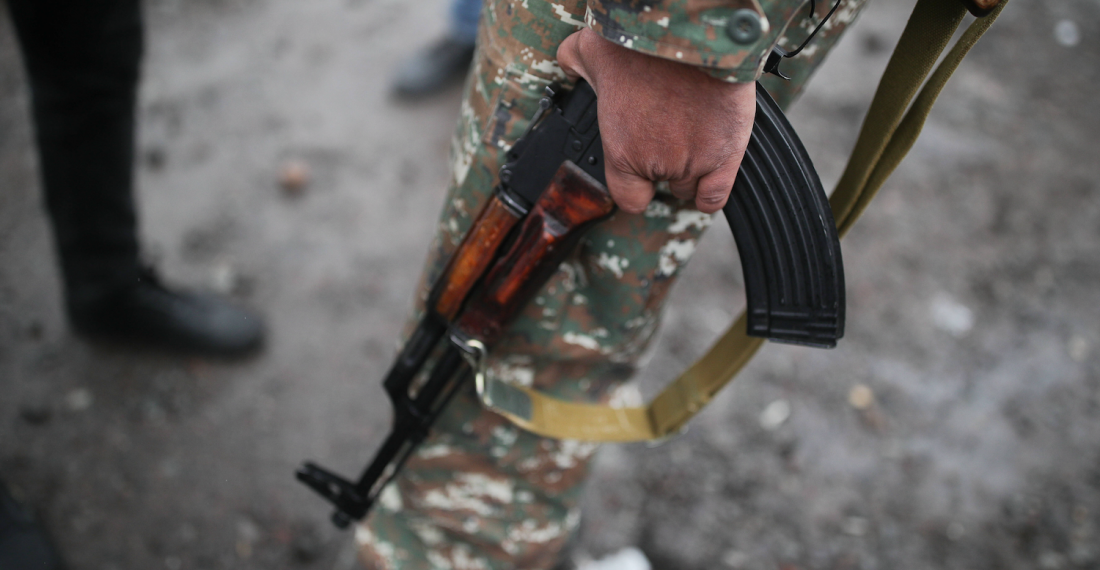Monday (27 September) marked the first year anniversary of the start of the 2020 Karabakh war between Armenia and Azerbaijan. Both countries remembered those who lost their lives in the 44-day war with a one minute silence, and various activities.
In Azerbaijan, the national day of remembrance featured moments of silence and memorials across the country. The president, Ilham Aliyev, took part in a military march with other high ranking officials, and honoured the deceased servicemen in an address to the nation: “I bow once again to the memory of all our martyrs, to the souls of the martyrs of the first and second Karabakh wars... Our heroic soldiers and officers who gave us this Victory are the source of our pride. Their heroism, their bravery and self-sacrifice have already become a saga”.
In Armenia, senior government officials including the prime minister, Nikol Pashinyan, and the deputy prime minister, Suren Papikyan, visited the Yerablur military cemetery to pay tribute to those who lost their lives in last year’s war. A moment of silence and commemorative events were also observed across the country. Pashinyan held a phone call with the self-styled president of the self-proclaimed Nagorno-Karabakh Republic (NKR) in which the two discussed the process of overcoming the conflict.
That the impact of the war is still felt so strongly in Armenia and Azerbaijan is both because of how recent the conflict was, and also because of the sheer devastation it caused. Using official government figures, the International Crisis Group reports roughly 2900 casualties on each side, with hundreds more unaccounted for. The war also led to the complete destruction of much infrastructure and the mass displacement of civilians; authorities from the self-proclaimed NKR have estimated that between 90,000 and 150,000 of its inhabitants were displaced during the fighting, although some have subsequently returned. Furthermore, thousands of soldiers and civilians have suffered life altering physical injuries and severe psychological trauma.
In a statement published on the anniversary, the Azerbaijani MFA affirmed that “Azerbaijan is ready to normalize relations with Armenia based on strict compliance with international law concerning the country's sovereignty and territorial integrity and the inviolability of international borders”.
On its part the Armenian foreign ministry in a statement said that "a comprehensive settlement of the Nagorno-Karabakh conflict presupposes the determination of Artsakh's status, taking into account the realization of the inalienable right to self-determination, the security of the Artsakh people, the safe and dignified return of displaced people to their settlements throughout Nagorno-Karabakh, and the preservation of Armenian cultural and religious heritage."
"Only the agreements reached within the framework of the peace process can open a new page for peace, security and development in the region. The Republic of Armenia stands for the full launch of the Nagorno-Karabakh peace process within the framework of the OSCE Minsk Group Co-Chairs. At the same time, the urgent settlement of humanitarian issues is of paramount importance, including the repatriation of all prisoners of war, civilian hostages, and cases of enforced disappearances", the Armenian statement said.
However, while both sides have verbally expressed a willingness to work towards a normalisation of relations, progress has been minimal. Significant impediments to the creation of a peace deal still persist, and the two sides continue to give different interpretation to the current situation, with a lot of outstanding issues particularly on border demarcation. Finally, the November 2020 ceasefire has not prevented skirmishes from regularly breaking out over the past year, culminating in an “intense firefight” in summer and the re-establishment of the ceasefire by Moscow.
As both countries grapple with the impact of the war one year on, the prospects of real peace between Armenia and Azerbaijan remains elusive.



